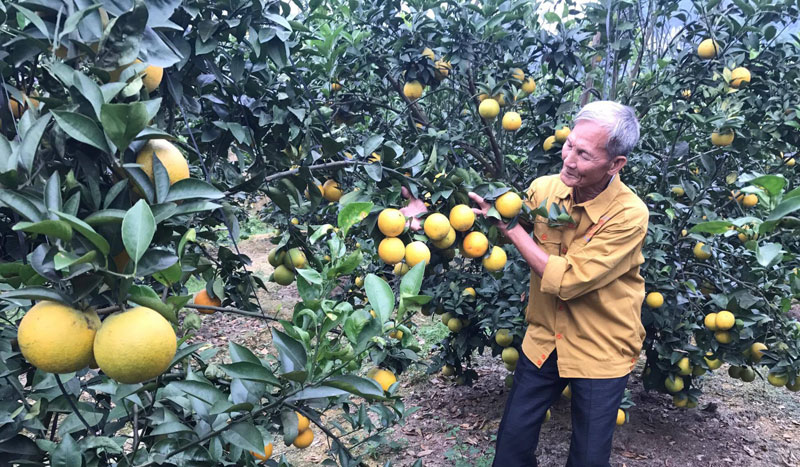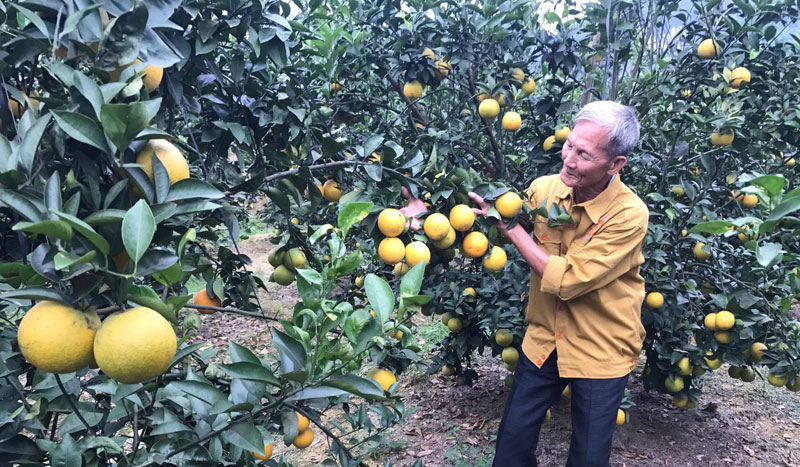
(HBO) – In recent years, integrated farming models have been formed and developed strongly in Phu Thanh commune, Lac Thuy district, northern mountainous Hoa Binh province. Local farmers have promoted available advantages to scale up agricultural production, increase productivity and improve competitiveness of their products in the market.

The
orange cultivation model of Mr. Chu Duc Bien’s family (Ry hamlet, Phu Thanh
commune, Lac Thuy district) earns 600 million VND a year.
Phu Thanh commune has more than 50
farms, including 36 farms of fruit-trees with a total area of 350ha, mainly citrus
fruit-trees which account for over 85 percent of the fruit-tree area.
There
are eight livestock breeding farms where raise chickens, cows and pigs and
eight integrated farms and many small-scale models. These farms are raising a
total of 100,000 chickens; 6,100 pigs and 995 buffalos and cows.
Outstanding
farmers in the commune are Mr. Nguyen Duy Lanh (Bot hamlet) with an integrated
farming model earning nearly 1 billion VND per year; Mr. Chu Duc Bien (Ry
hamlet) who owns 6 ha of citrus fruit-trees, earning 600 million VND a year;
and Mr. Nguyen Van Dung (Dong Danh hamlet) with a farm breeding 12,000 heads of
Lac Thuy chickens which help him pocket 500 million VND a year.
According to Mr. Chu Duc Bien, the farming model is a sustainable and stable direction,
bringing high incomes to local farmers.
"I
have taken full advantage of soil and climate to plant citrus fruit-trees under
VietGAP standards, while applying new technologies in cultivation”, Bien said,
adding that the farm helped his family earn 600 million VND this year.
Exploiting
every condition of hilly land to develop livestock breeding, the number of
chicken farms in Lac Thuy has been expanded, towards building a brand for
Lac Thuy chickens.
Statistics
released by the commune’s People’s Committee shows that there are many
large-scale chicken breeding farms, such as those of Mr Nguyen Van Dung (Dong
Danh hamlet) with a flock of 12,000 chickens and Mr Nguyen Phuong Phuc (Tan Phu
hamlet) with a flock of 8,000 chickens.
A
number of households that were granted certificates of integrated farm models, have
been provided with preferential loans, making it easy for them to improve
effectiveness and expand their production and business./.
According to data from the Hoa Binh Provincial Party Committee, the industrial production index for the first six months of 2025 is estimated to have increased by 20% compared to the same period last year. This marks the highest year-on-year growth rate for this period since 2020.
In the first six months of 2025, Hoa Binh province’s export turnover was estimated at 1.145 billion USD, marking an 18.11% increase compared to the same period in 2024. Import turnover was estimated at $ 804 million, a 17.15% increase, which helped the province maintain a positive trade balance.
The lives of the ethnic minority farmers in Tan Lac district have gradually improved thanks to the new directions in agricultural production. This is a testament to the collective strength fostered through the professional associations and groups implemented by various levels of the district’s Farmers’ Union.
With the motto the "product quality comes first,” after nearly one year of establishment and operation, Muong village’s Clean Food Agricultural and Commercial Cooperative, located in Cau Hamlet, Hung Son Commune (Kim Boi district), has launched reputable, high-quality agricultural products to the market that are well-received by consumers. The products such as Muong village’s pork sausage, salt-cured chicken, and salt-cured pork hocks have gradually carved out a place in the market and they are on the path to obtaining the OCOP certification.
In the past, the phrase "bumper harvest, rock-bottom prices" was a familiar refrain for Vietnamese farmers engaged in fragmented, small-scale agriculture. But today, a new spirit is emerging across rural areas of Hoa Binh province - one of collaboration, organisation, and collective economic models that provide a stable foundation for production.
Maintaining growing area codes and packing facility codes in accordance with regulations is a mandatory requirement for agricultural products to be eligible for export. Recently, the Department of Agriculture and Environment of Hoa Binh province has intensified technical supervision of designated farming areas and packing facilities to safeguard the "green passport" that enables its products to access international markets.



